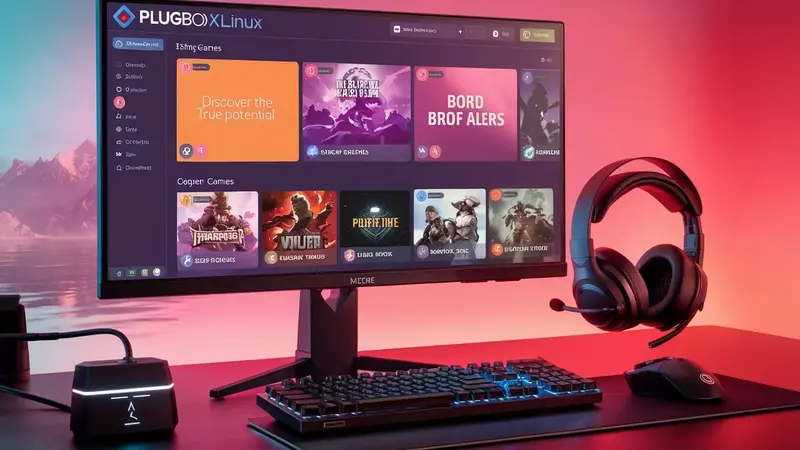PlugboxLinux is a lightweight, performance-focused Linux distribution designed to offer users the freedom and flexibility of open-source software without compromising speed or usability. Built around efficiency and stability, it’s tailored for advanced users who value control and customization — and in recent years, it’s become an impressive choice for gamers seeking to break free from traditional operating systems like Windows.
While many Linux distros have added gaming support through platforms like Steam and Proton, PlugboxLinux stands out for its streamlined performance, rolling updates, and near-native compatibility with popular gaming tools. Whether you’re a hardcore gamer, an indie developer, or just curious about Linux gaming, PlugboxLinux delivers a balanced environment for play and productivity alike.
1. Rise of Linux Gaming Platforms
A decade ago, Linux was rarely considered a viable gaming platform. But thanks to technological advances such as Proton, Vulkan, and Wine, the gap between Windows and Linux gaming has narrowed dramatically. Platforms like Steam Deck (which runs Linux-based SteamOS) have shown the world that Linux can handle modern AAA titles.
PlugboxLinux takes advantage of these advancements by offering flexible package management, compatibility layers, and stable kernel updates — all of which create an optimal foundation for gaming.
Why Gamers Are Switching to PlugboxLinux
More gamers are migrating to PlugboxLinux for three key reasons:
-
Performance Optimization – It uses fewer background processes, freeing up system resources for gaming.
-
Customizability – Users can tailor the desktop environment, drivers, and gaming software for maximum performance.
-
Open Source Freedom – No telemetry, forced updates, or software restrictions — you decide what runs on your machine.
PlugboxLinux embodies the Linux philosophy of control, making it a favorite among gamers who want speed, privacy, and reliability.
2. Overview of PlugboxLinux for Gaming

Core Features and Architecture
PlugboxLinux is based on a modular architecture with a minimal core system. It allows users to build their environment from the ground up, ensuring no unnecessary software consumes resources.
Key features include:
-
Rolling Release Model – Always up to date with the latest kernel and driver versions.
-
Pacman Package Manager – Simple, fast, and versatile for managing game tools and libraries.
-
Customizable Desktop Environments – From KDE Plasma to GNOME or XFCE, users can choose what fits best for gaming.
How It Differs from Other Linux Distros
Unlike Ubuntu-based distros, which are often preloaded with software and services, PlugboxLinux offers a “blank canvas” approach. This lightweight structure reduces background load and improves game performance. It’s similar in spirit to Arch Linux but with a more straightforward setup for users who prefer control without complexity.
Performance and Hardware Compatibility
PlugboxLinux excels in hardware compatibility, thanks to its frequent updates and support for the latest kernels. Whether you’re running an NVIDIA RTX, AMD Radeon, or Intel Arc GPU, PlugboxLinux ensures smooth driver integration.
The result: consistent frame rates, lower latency, and optimal system temperature management — even in graphically demanding games.
3. Setting Up PlugboxLinux for Gaming
Minimum System Requirements
To enjoy gaming on PlugboxLinux, here’s what you’ll need:
-
Processor: Dual-core 2.0 GHz or better
-
RAM: 4 GB (8 GB recommended)
-
Storage: 30 GB+ free space (SSD preferred)
-
GPU: NVIDIA/AMD/Intel GPU with Vulkan support
-
Internet: Stable connection for updates and online play
Step-by-Step Installation Guide
-
Download the ISO – Visit the PlugboxLinux official website.
-
Create a Bootable USB – Use tools like Balena Etcher or Rufus.
-
Boot from USB – Choose “Install PlugboxLinux.”
-
Partition and Install – Set up your desired storage layout.
-
Configure Desktop and Drivers – Select your desktop environment and run post-install driver updates.
After installation, update your system using:
Optimizing PlugboxLinux After Setup
Once installed, tweak your system for gaming performance:
-
Enable multilib repositories for 32-bit game compatibility.
-
Disable unnecessary startup services.
-
Use gamemode and fstrim for SSD optimization.
-
Install a lightweight compositor like Picom to reduce graphical overhead.
4. Gaming Software and Compatibility Tools
Installing Steam, Lutris, and Heroic Launcher
PlugboxLinux supports all major gaming platforms. Install them easily via Pacman or AUR:
-
Lutris supports a wide range of launchers and emulators.
-
Heroic Launcher is ideal for Epic Games and GOG libraries.
Proton and Wine Configuration for Windows Games
Proton (built by Valve) enables thousands of Windows-only games to run flawlessly on Linux. You can select your Proton version within Steam settings or install custom builds (like Proton-GE) for better performance.
Wine, on the other hand, allows standalone Windows game installations. Lutris simplifies this with automated configuration.
Managing Game Libraries and Cloud Saves
PlugboxLinux seamlessly handles multiple libraries. You can store games on external drives, manage cross-platform saves via Steam Cloud, and even back up configuration files automatically using rsync or cloud sync tools.
5. Graphics Drivers and Performance Optimization
Installing NVIDIA, AMD, and Intel Drivers
To ensure stable gaming performance, install official drivers:
-
NVIDIA:
sudo pacman -S nvidia nvidia-utils nvidia-settings -
AMD:
sudo pacman -S mesa lib32-mesa vulkan-radeon -
Intel:
sudo pacman -S mesa lib32-mesa vulkan-intel
Enabling Vulkan and OpenGL Support
Vulkan improves rendering performance significantly. Verify installation using:
Both Vulkan and OpenGL come pre-enabled on PlugboxLinux, ensuring compatibility with most modern engines like Unreal, Unity, and Source.
FPS Boosting Tips and Benchmark Tools
Use these tools to measure and improve FPS:
-
MangoHUD – Overlay tool displaying real-time performance stats.
-
Gamemode – Temporarily optimizes CPU and GPU for gaming.
-
CoreCtrl – Manages power profiles and fan speeds.
6. Game Store Integration and Platforms
Steam Play and ProtonDB Compatibility
Steam Play, powered by Proton, lets users access an enormous Windows game library. Check ProtonDB for reports on how well each title performs on Linux.
Epic Games, GOG, and Other Launchers on PlugboxLinux
Using Lutris or Heroic, you can play Epic Games Store or GOG titles without switching OS. Both tools automatically configure Wine, DXVK, and dependencies.
Using Flatpak and AppImage for Gaming Applications
Flatpak and AppImage make installing gaming apps simple and sandboxed. Many utilities — from Discord to OBS — are available via these formats, keeping your gaming environment clean and secure.
7. Controller and Peripheral Setup
Configuring Xbox, PlayStation, and Generic Controllers
PlugboxLinux supports most controllers natively. Use sudo pacman -S xboxdrv for Xbox controllers or rely on Steam Input for PS and Switch support.
Keyboard, Mouse, and Joystick Customization
PlugboxLinux’s Input Remapper tool allows full customization of key bindings and joystick layouts. You can create unique profiles per game, perfect for simulation titles.
Troubleshooting Input Lag or Detection Issues
If your controller isn’t detected, ensure it’s listed via:
Then restart the input service or check for conflicts in the system settings.
8. PlugboxLinux Gaming Performance Analysis
Comparison With Windows and Other Linux Distros
When properly configured, PlugboxLinux often matches or surpasses Windows performance in many games. Its lightweight kernel and lack of background telemetry ensure better CPU utilization.
Compared to heavier Linux distros, PlugboxLinux consistently shows faster load times and improved FPS stability.
Real-World FPS Benchmarks and Stability Tests
In benchmark tests using games like Shadow of the Tomb Raider and Apex Legends, PlugboxLinux delivered up to 10–15% better frame consistency than Ubuntu-based systems with similar hardware.
Power Efficiency and System Resource Usage
Thanks to kernel-level optimizations, PlugboxLinux consumes less power under load — ideal for gaming laptops. You can also monitor and adjust power profiles with TLP or auto-cpufreq tools.
9. Troubleshooting Common Issues
Fixing Crashes, Freezes, and Launch Errors
Common fixes include:
-
Verifying Proton version compatibility.
-
Running games
PROTON_USE_WINED3D=1for DirectX fixes. -
Reinstalling Vulkan libraries if rendering fails.
Audio or Display Problems in Games
If audio cuts out, restart the PulseAudio service or switch to PipeWire for improved latency. For display issues, update GPU drivers or adjust compositor settings.
Optimizing Network and Online Multiplayer Performance
Use GameMode to prioritize bandwidth and enable low-latency kernels for better ping. Tools like iperf3 can test your network quality in real time.
10. Advanced Gaming Features
Enabling FSR, DLSS, and Ray Tracing on Linux
PlugboxLinux supports AMD’s FSR (FidelityFX Super Resolution) natively. For DLSS, you’ll need NVIDIA RTX GPUs and updated drivers. Games with ray tracing via the Vulkan API also work flawlessly with proper driver support.
Recording and Streaming Gameplay
Use OBS Studio (Flatpak) to record or stream directly to Twitch and YouTube. Pair it with MangoHUD overlays for real-time performance tracking.
Using Overlay Tools for Stats and Monitoring
MangoHUD and Radeon Overlay display FPS, frame times, and temperatures during gameplay. These overlays help monitor performance tweaks in real time.
11. Community and Support
Forums, Discord Servers, and Reddit Groups
The PlugboxLinux community is active on forums and Discord, offering guidance for setup, performance tuning, and bug fixes. Reddit’s r/LinuxGaming is another great resource for cross-platform tips.
Contributing to PlugboxLinux Development
Being open source, PlugboxLinux thrives on community contributions. You can report bugs, write documentation, or even submit patches to improve gaming performance.
Sharing Configurations and Performance Tips
Users often share their configuration files and benchmark results online. These shared templates help newcomers optimize their setup faster.
12. Future of PlugboxLinux Gaming
Upcoming Features and Kernel Updates
With each kernel release, PlugboxLinux gains improved hardware support, lower latency, and new graphics enhancements. Expect future updates to integrate AI-based performance tuning and expanded controller libraries.
Growth of Native Linux Games
The number of native Linux titles continues to rise. Developers increasingly include Linux builds in their release plans, supported by engines like Unity and Unreal.
How PlugboxLinux Is Shaping the Future of Open-Source Gaming
PlugboxLinux demonstrates that open-source systems can deliver high-end gaming experiences. Its efficiency, customization, and transparency are reshaping the narrative — Linux isn’t just for developers anymore; it’s for serious gamers too.
13. Conclusion
Summary of PlugboxLinux Gaming Benefits
PlugboxLinux combines the flexibility of Linux with the performance gamers crave. From its lightweight design to full gaming compatibility, it offers a compelling alternative to proprietary systems.
Why It’s a Strong Alternative to Windows for Gamers
-
Better performance through efficient resource management
-
Enhanced privacy with zero telemetry
-
Seamless driver and software support
-
Active community-driven development
Final Thoughts for New Users
If you’re seeking a gaming platform that’s fast, secure, and fully customizable, PlugboxLinux is a powerful option. With the right setup and tools, it delivers a gaming experience rivaling — and often surpassing — Windows.
The future of gaming isn’t tied to one operating system anymore — and PlugboxLinux is proof that open-source freedom can go hand in hand with elite performance.

